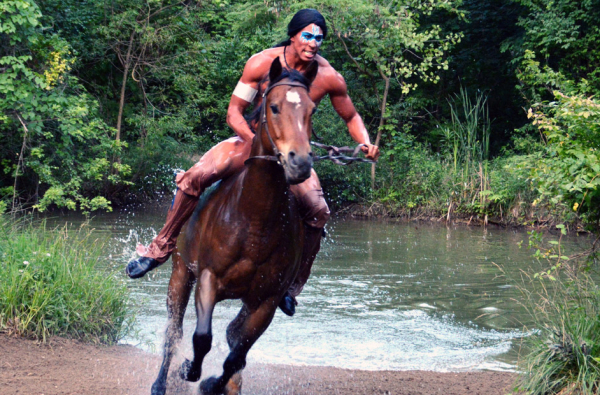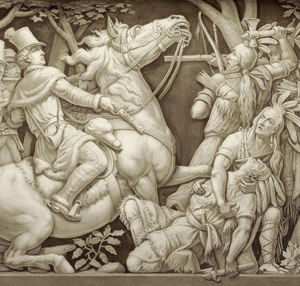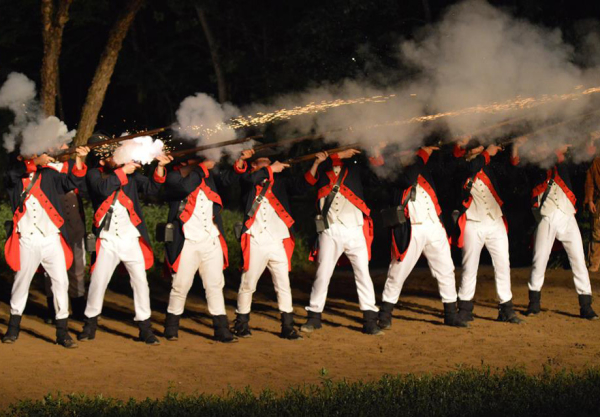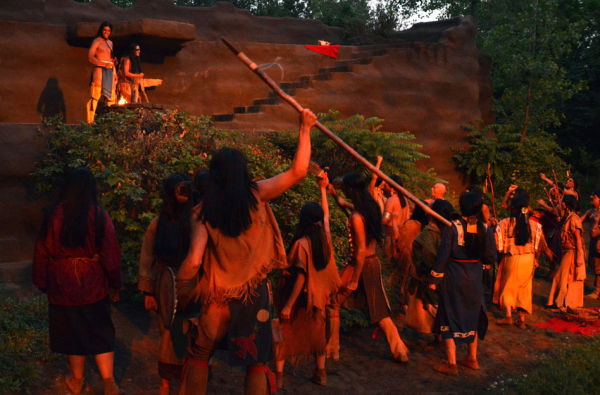American History That Rivals Anything in Shakespeare: Tecumseh! Brings the Legendary Shawnee Chief Back to Life

(© Joe E. Murray)
America would look very different today if not for the occurrence of the events depicted in Tecumseh!, the massive outdoor drama now in its 42nd year at the Sugarloaf Mountain Amphitheatre in Chillicothe, Ohio. Born on the Scioto River in 1768, Tecumseh was arguably the most important leader of the Shawnee, a tribe native to the Ohio River Valley. Rising to prominence at a young age, Tecumseh led a confederacy of Indian tribes against the encroaching American settlers. He also allied with the British in the War of 1812 and participated in the capture of Fort Detroit. His ultimate aim was to force the Americans back east of the Appalachian Mountains.

Tecumseh is so important in the story of our country that his death is depicted alongside 18 other pivotal moments in American history on the great frieze that encircles the United States Capitol rotunda. Essentially, Tecumseh had to die for modern America to be born. Still, relatively few of today's Americans know who he is, fewer still the details of his story. "Most American history books don't talk about the Shawnee," lamented director Jenny Male. For the past 42 summers, however, The Scioto Society has aimed to rectify that with their outdoor production of Allan W. Eckert's Tecumseh!
Based on Eckert's book A Sorrow in Our Heart: The Life of Tecumseh, the show tells the story of the Shawnee chief and how he nearly stopped "manifest destiny" dead in its tracks. It also dramatizes, in heartbreaking fashion, the misplaced trust Tecumseh had for his brother, the one-eyed prophet Tenskwatawa. While Tecumseh was on a diplomatic mission to rally the support of far-flung tribes, Tenskwatawa famously ordered the attack on U.S. troops under the command of Governor William Henry Harrison at Tippecanoe, a major defeat for Tecumseh's army. That moment marked the beginning of Tecumseh's downfall, and helped to create the Harrison Presidency.
The play is Shakespearean in its scope and dramatic vision. "Tecumseh actually had a one-eyed brother with a lust for power," Male noted with a laugh. "You cannot make that up." Like Richard III or Henry V before it, Tecumseh! attempts to dramatize history in human terms that are immediately accessible to any audience. "Even if you don't have a background in Native American or U.S. history, everyone understands family," Male asserted. "Everyone knows what it is to love someone and lose someone. Everyone understands betrayal."

(© Joe E. Murray)
Of course, while Shakespeare beseeches his audience, "Think when we talk of horses, that you see them / Printing their proud hoofs i' the receiving earth," Eckert doesn't need to. The show features 52 actors riding live horses, shooting realistic guns, and generally beating each other up (or at least appearing to do so with the help of some elegantly choreographed stage combat). While the script has remained the same since 1973, the blocking and fight sequences are subject to change from year to year, especially under the guidance of a new director.
This is Male's first summer at the helm of Tecumseh! after several seasons with the show in different capacities. "I joined the show in 2000 as an actor," she explained, adding, "In 2001 I became the dance choreographer and in 2004 they made me the fight director." She's not the only returning member of the team: Several actors come back to Chillicothe year after year, including the man currently playing Tecumseh, Stevyn Carmona.
"When Stevyn started in the show in 2004, he had one line," Male recalled. "As the years went on he got more experience with horseback and fighting and being able to project his voice. Now he's in his third year playing Tecumseh." Being in excellent physical and vocal form is essential to this show, which doesn't use microphone amplification and puts its actors through a grueling two hours and 40 minutes of highly physical staging every night.
"It does take a certain personality to do this type of theater," Male admitted. The actors live on site for the duration of the run, forming the kind of close bond that few casts ever do. "It's kind of like summer camp," she elaborated. "It's cabins in the woods and you get to sit around the fire at night and look up at the stars."
Amazingly, considering the expense of housing and paying 52 actors, the ticket price for ''Tecumseh!" is only $24.95 ($17.95 for ages 10 and under). "We really want a lot of people to be able to come and see this show," Male said, adding, "$24.95 is still a lot of money for some people." The show also relies on the willingness of patrons to travel hundreds of miles. The Sugarloaf Mountain Amphitheatre seats 1,800, so even if every resident of Chillicothe (population: 21,901) bought a ticket, it wouldn't be enough to keep them in business. They need to keep the prices low, especially for the people who "live in Cincinnati, and even Kentucky or Pennsylvania…and [drive out to] see the show," Male explained.
One group regularly attends from beyond the Mississippi. According to Male, representatives from the Absentee Shawnee Tribe of Oklahoma make the trek up to their ancestral homeland of Ohio every year to see the show. "Arthur Rolette, the late chairman of the Absentee Shawnee Tribe, gave us the wolf chant that's used in the show as well as the lament that's used after the battle of Tippecanoe," she said.
Considering the production's collaboration with the remaining Shawnee and the sensitivity of this history, it is very important for Male that everyone in the production is deeply invested in the story. "I'm really careful with casting to make sure that this is a show that will mean a lot to them." It's not just another acting job: It's a nightly reenactment of one of the greatest tragedies in our history, without which the American Midwest would likely not exist.

(© Joe E. Murray)










